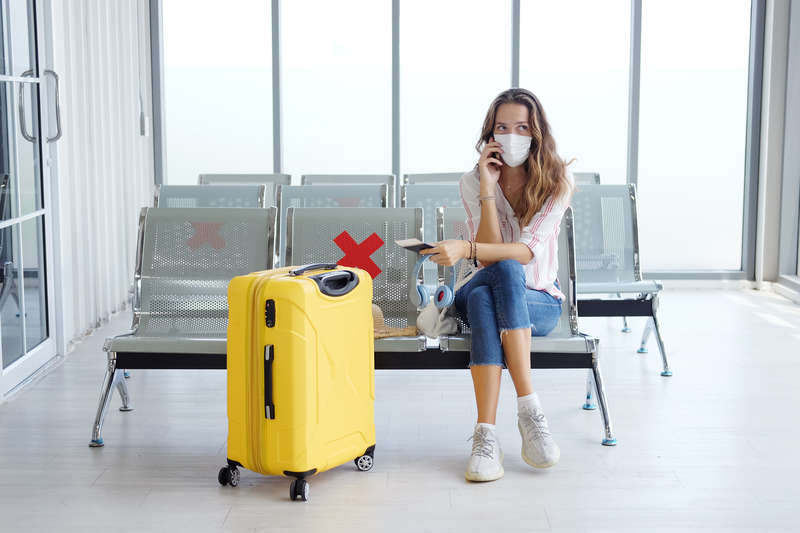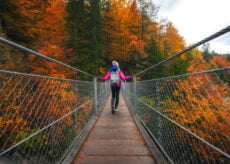15 Easy Tips to Stay Healthy While Traveling This Winter

For many of us, it’s been a while since we’ve had the chance to pack our bags and just go. We’ve missed family gatherings, business trips, and fun vacations. Now we’re itching to hitch a ride on the nearest plane, train, or automobile for a new view, some fun, and perhaps most of all, to see loved ones.
After the previous year’s historically low levels of colds and flus (due in large part to the Covid-19 restrictions), we’re now being warned that cold and flu season could be worse this year (now that restrictions are being relaxed in many states and countries—at least for now). Plus, many people have gone back to work and schools and started socializing again, increasing exposure to more colds, flus, and other not-so-fun germs. 1
Finally, many of us are just plain sick and tired of all the extra vigilance from the past year and a half and may be tempted to relax a bit on the distancing, mask wearing, and improved hygiene.
Yet to cut the risk of illness, it’s worth taking some extra precautions to stay healthy while traveling. After all, getting sick is never any fun.
Here are tips infectious disease experts recommend to help reduce the risks, so you are more likely to arrive home without the sniffles, body aches, and other annoying cold or flu symptoms (or worse).
Tips to Stay Healthy While Traveling
1. Stay hydrated
It’s even more difficult to stay hydrated while traveling than when at home. To help avoid dehydration, start each morning with a big glass of water, and then carry a water bottle with you to sip on throughout the day.
2. Get plenty of rest
Especially when traveling to different time zones, it can be difficult to ensure you’re getting enough rest. But we’re all more susceptible to illness when rundown. Don’t skimp on sleep, and remember to listen to your body and rest as you need to, even if that means you may miss out on some socializing.
If you know you’re more susceptible to your circadian rhythm being disrupted (which can seriously compromise the immune system), a week before the trip starts, gradually begin to shift your bedtime and waking times to match your destination. Once you’ve arrived, spend as much time outside as you can. Sun exposure can help your body adjust more quickly to the new time zone and help you stay healthy while traveling.
3. Choose your seat wisely
If you’re traveling with others—via plane, bus, or train—choosing where you sit can help you stay healthy. If you typically choose aisle seats to get up and out easier, you may want to rethink that. For one, it can be more difficult to get rest if you’re having to get up and down every time the person or people next to you need to get up.
Plus, according to the Centers for Disease Control and Prevention, you are also more likely to be exposed to viruses in the aisle seats. This is because people who are walking by (for example, on a trip to the bathroom), often grab onto the top of aisle seats for support as they walk by.
Fortunately, airplane air has to pass through fine filters that help prevent the circulation of bacteria and viruses. Just remember to drink water throughout the flight as the air tends to be very dry, making it more difficult to stay hydrated.
4. Beat jet lag
One big reason people tend to miss out on sleep when traveling is due to jet lag. Try using a quality sleep supplement, drinking a soothing chamomile tea, or take some form of CBD to help you sleep on your flight and before bed the first few nights of your trip to help your body adjust to the schedule changes.
Speaking of the flight, if you will be resting, it’s a good idea to prevent a stiff, cramped neck by packing a travel pillow. You’ll be more comfortable and therefore likely to sleep sounder.
Making sleep hygiene even a bigger part of your daily routine can also help. This means putting away smartphones, tablets, or laptops at least an hour before sleeping, avoiding alcohol or caffeine in the afternoon and evening, and taking steps to get into sleep rhythm with your current location as quickly as possible.
5. Focus on fuel
Fuel, as in a healthy breakfast, lunch, and dinner that provide energy and plenty of nutrients. For the most part, skip past the empty, sugar-filled calories and reach for healthier options like whole vegetables and fruits, quality proteins, and whole grains to stay healthy while traveling.
That said, if you are traveling to a less-developed country, you’ll want to ensure you consume beverages and foods that have been prepared properly. Make sure you consume meat and seafood that’s been thoroughly cooked and served hot. And steer clear of raw, untreated water or ice cubes. This is one time when bottled water is safer. It may also be a good idea to avoid fresh fruits and vegetables unless you know they’re safe.
You can boost nutrition levels by drinking a nutrient-rich greens or reds drink like MetaboGreens® or Eternal Reds™. Just toss a scoop into your water bottle, give it a good shake, and enjoy a refreshing dose of nutrients. It’s also a good idea to bring any immune-supporting supplements to take throughout the trip, including vitamin C, vitamin D, zinc, and/or a good quality multivitamin.
Finally, practice “hara hachi bu” to keep energy levels high without feeling weighed down. Hara hachi bu is a Japanese term that translates roughly to, “eat until only 80% full.” That way you don’t overeat, but you eat enough to keep going. Share a meal with a friend or save it for later to avoid overeating.
6. Limit the booze and sweets
I know—holidays are about letting things go and just having fun. But both excess alcohol and excess sugar can hinder your immune system from working well and fighting off intruders. Plus, too much sugar and booze can interfere with your sleep. Enjoy yourself, but keep the treats in moderation to help your body stay healthy and strong.
This not only goes for cakes and breakfast pastries but for sugar-laden beverages as well. Enjoy a treat or two throughout the trip, but use water for rehydration and you’ll be more likely to keep your immune system in fighting shape.
7. Get plenty of exercise
Even if you’re getting away to release stress and just let go (we hear you!), you’ll still want to move your body. You don’t necessarily need to get in a hardcore workout, though you certainly can if you want to. But start each day with a gentle stretch of the arms, legs, neck, shoulders, and back to get your body ready for the day. Then take some time to go for a walk or hike, do some gentle yoga or Pilates, or do a short hotel workout to keep your energy levels up and your blood flowing.
You can also choose to use walking as your main form of transportation. This is a great way to slow down and get to know a city, see the architecture, and learn about the people and the culture. Or, to see the great outdoors—to hike the mountains, stroll the beaches, or bathe in forest air.
Exercise stimulates the immune system and also releases feel-good endorphins for an even more enjoyable vacation. (And if you’re visiting the in-laws or grumpy siblings, the gym can be a great excuse to get out of the house for a bit. 😉)
At the end of the day, again take a few minutes to lightly stretch and relax the muscles, which can help you sleep and ease any muscle aches if you’ve done a lot of walking. And if your digestion gets off track (as many as 40% of travelers experience constipation), some ab work or gentle yoga may help move out some of the waste and toxins from the intestines.
Of course, before you hit the road, you’ll also want to make sure your body is fit to travel. Do some form of resistance training or weight lifting at least a couple of times a week and some form of cardio exercise daily (or at least five days a week). This can be a nice walk, hike, jog, dance class, HIIT, plyometrics, etc.
8. Stretch out cramps
Traveling often means sitting for long periods in cramped positions. Especially if you’re over 50, are overweight, or take certain forms of medication (including birth control), this can increase the risk of developing blood clots.
Before you sit down for your flight, take a nice, brisk walk. Then wear compression socks, which encourage blood flow. And don’t forget to drink plenty of water.
If you have a longer flight, get up out of your seat and walk down the aisle if possible. At the very least, flex and point your toes with your legs slightly raised to help stretch out your calf muscles throughout the journey.
Once you get to your final location, help improve blood flow even more by elevating your legs. Lay a towel or blanket on the floor, and then prop your legs up on a wall, chair, or bed. Then relax and breathe for ten or so minutes until your legs feel better and you feel relaxed.
9. Don’t overdo it
Especially when trips are few and far between, you may be tempted to fit everything in, starting at first light and going until you collapse at the end of a very long day, only to start over to do the same thing the next day. Unfortunately, this type of schedule can wear you out, leaving you more susceptible to colds and infections.
Prioritize what you want to explore, and pace yourself. It’s impossible to see an entire city in a single day, so it’s better to decide in advance what’s most important for you or to spread out the itinerary over several days.
Don’t be afraid to take small breaks throughout the day to take in the world around you, breathe, and really enjoy the moment. You won’t wear yourself out and will likely find the trip is even more enjoyable, and you’ll be better able to really get to know more about your destination.
10. Breathe through it
Even when you’re traveling for pleasure, it can add some unusual stress and induce anxiety as you go to new places, enjoy new experiences, and get out of your comfort zone. To help your immune system stay balanced and enjoy the trip even more, take steps to reduce your stress by focusing on some deep breathing or meditation.
11. Spend time in nature
If you’re driving, take a few minutes at a rest stop to get out of the car and walk around. If you’re traveling by train, bus, or plane, you may need to wait until you arrive at your destination. As soon as possible, take in some fresh air and sunlight, which can both boost energy and mood.
12. Wash those hands
Germs, bacteria, and viruses can be found wherever we go, and traveling increases exposure to those your immune system may not have been used to fighting. One of the best things you can do to help avoid getting sick is to wash your hands often, especially before eating. If you don’t know if you’ll have ready access to soap and water, carry wet wipes and/or hand sanitizers with you. Just make sure they’re at least 60% alcohol, so they can effectively kill germs.
After eating, remember to again wipe down your area and wash your hands to prevent the spread of germs.
13. Be a clean freak
When traveling, we come in close contact with tons of other people’s germs. Especially if traveling on a plane, bus, or train (rather than your own vehicle), the close proximity with others means germs. Some research, for example, indicates that the highest concentration of germs on a plane is found on the tray table. Before you get comfortable, take out a sanitizing wipe or two and wash off surfaces you’ll be in contact with. In addition to the tray table, hit the arm rests, air flow, lights, and anything else you’re likely to touch.
Don’t stop cleaning once off the plane, train, or automobile. Hit anything you’ll be in contact with—from gas nozzles to grocery carts—with a sanitizing wipe, and then use hand sanitizer or wash your hands once done. You’ll also want to wipe down high-touch areas in your hotel room and rental car (if you get one).
Let people call you a freak if they have to. Taking a few seconds to clean off surfaces can help prevent you from catching a cold, the flu, or other infections that can linger on surfaces.
Even after cleaning everything around you, washing regularly, or using hand sanitizer, stay extra vigilant, and keep your hands off your face. The membranes around the mouth, nose, eyes, and ears are more likely to pick up microscopic germs. One of the best ways to stay healthy while traveling is to not touch your face.
14. Pack a first-aid kit
In your carry on, it can be helpful to bring some simple just-in-case supplies. A few band-aids, an over-the-counter pain reliever, antihistamine, antidiarrheal like Pepto-Bismol, disinfectants, and any prescription medications you need can all be carried in a small package. And when you need them, you need them.
Because travel can also get unexpectedly delayed or disrupted, if you are on prescription medications, pack extra in case you are unable to get home on time.
And, don’t forget your sunscreen and apply it every morning and again every few hours during the day. Finally, if you’re visiting a location with lots of biting bugs (e.g., mosquitoes, ticks, etc.), include some insect repellent to help prevent itchy or painful bites as well as disease.
15. Consult with experts
Especially if you’re traveling abroad, it’s a good idea to meet with your doctor or a travel expert to see if there are any recommended vaccinations. Depending on the region, you may be exposed to diseases that you typically aren’t concerned about, such as typhoid, hepatitis, or malaria. Find out how you can protect yourself from and avoid tick bites, mosquito bites, or parasites that can make you really sick.
It’s also a good idea to check with the Centers for Disease Control and Prevention for the latest travel advisories.
If you have a pre-existing medical condition, work with your health-care team to make sure your condition is under control and monitor it while on your trip, so you stay healthy.
Finally, and perhaps most importantly, if you’re sick—with a cold, the flu, a stomach bug, Covid-19, etc., please stay home. It’s no fun traveling when you feel miserable. Plus, you also risk getting others sick. Reschedule when you’re feeling better, so you can fully enjoy the trip and protect fellow travelers.







 7 Signs Your Body is Seriously Low on Collagen (not just wrinkles)
7 Signs Your Body is Seriously Low on Collagen (not just wrinkles) Health Expert: "Turmeric Doesn't Work (unless...)"
Health Expert: "Turmeric Doesn't Work (unless...)" 3 Warning Signs Your Probiotic Supplement is a Total Waste
3 Warning Signs Your Probiotic Supplement is a Total Waste

